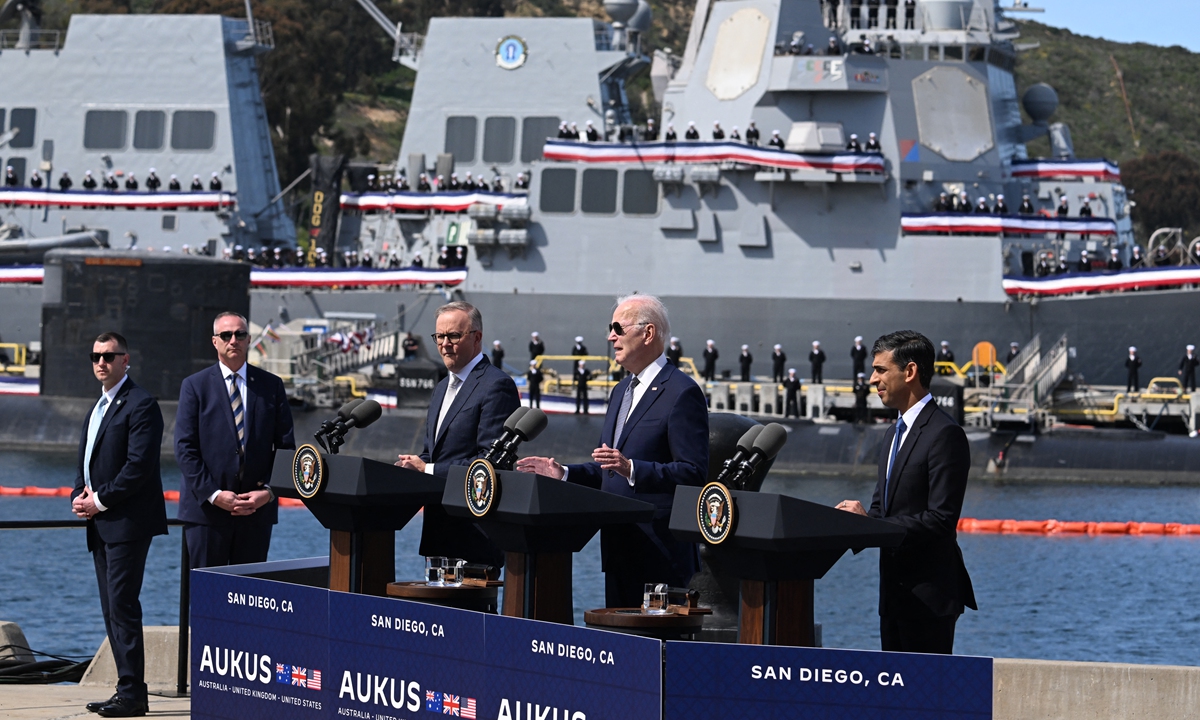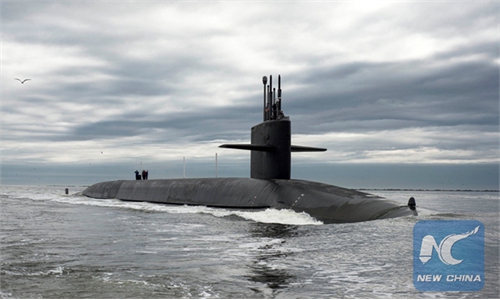China firmly opposes AUKUS' coercing IAEA to endorse its nuclear submarine cooperation: FM

US President Joe Biden (center) speaks alongside British Prime Minister Rishi Sunak (right) and Australian Prime Minister Anthony Albanese at a press conference during the AUKUS summit on March 13, 2023, at Naval Base Point Loma in San Diego, California. AUKUS is a trilateral security pact announced on September 15, 2021 for the Indo-Pacific region (See stories on Pages 3 and 5). Photo: AFP
China is gravely concerned about the International Atomic Energy Agency (IAEA) Director General's latest statement in relation to the AUKUS nuclear submarine cooperation and firmly opposed to the US, the UK and Australia's coercing the IAEA Secretariat into endorsement on the safeguards issues, Chinese Foreign Ministry spokesperson said on Wednesday.
The three countries have unveiled details of their plan to create a new fleet of nuclear-powered submarines, with Australia not only getting its first nuclear-powered subs - at least three - from the US, but the allies will also work to create a new fleet using cutting-edge tech, including UK-made Rolls-Royce reactors, read a report from the BBC on Tuesday.
The report particularly mentioned that the nuclear submarine project launched by the three countries aims to countering China's influence in the Indo-Pacific region.
Nuclear submarine cooperation between among the AUKUS involves the transfer of large amounts of weapons-grade highly enriched uranium from nuclear weapon states to a non-nuclear weapon state, which poses a serious nuclear proliferation risk and violates the purpose and object of the Treaty on the Non-Proliferation of Nuclear Weapons, Chinese Foreign Ministry spokesperson Wang Wenbin noted.
The current safeguards under the IAEA system cannot ensure that Australia will not divert relevant nuclear materials to the manufacture of nuclear weapons, Wang said, adding that the trilateral cooperation undermines the international nuclear non-proliferation system.
The AUKUS together with the secretariat of IAEA have no right to engage in private exchanges on the issue of trilateral nuclear submarine cooperation, as the three countries and the Agency Secretariat have no right to interpret the provisions of the comprehensive Safeguards Agreement without authorization from the international community, Wang added.
The spokesperson stressed that the safeguard issue related to AUKUS concerns the interests of all member states of the IAEA and should be jointly discussed and decided by all member states through transparent, open and inclusive intergovernmental process. Pending the consensus reached by all IAEA member states, the US, the UK and Australia should not proceed with relevant cooperation, and the IAEA Secretariat should not engage with the three countries on the safeguard arrangements for their nuclear submarine cooperation
The Chinese side urges the AUKUS to earnestly fulfill their nuclear non-proliferation obligations and not undermine the authority and effectiveness of international supervision system.
China also calls on all member states of IAEA to actively promote intergovernmental cooperation to find a solution to the safeguard issue on the nuclear submarines jointly designed by the US, the UK and Australia, safeguard the international nuclear non-proliferation regime with the NPT as the cornerstone, and maintain international peace and security.
Global Times



